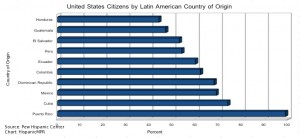U.S. Latinos top country of origin
Posted by Elena del Valle on November 9, 2009
Click on image to enlarge
While most people with an interest in Hispanic markets know that more than 60 percent of the United States Latino population is comprised of people of Mexican origin, few are aware of the breakdown by country of origin of the remainder. The remaining third come from Puerto Rico, Cuba, El Salvador, Dominican Republic, Guatemala, Colombia, Honduras, Ecuador, and Peru.
Gathering information on ethnicity and country of origin can be challenging and accurate results require additional time and effort for demographic researchers. For example, the concept of ethnicity and country of origin is in itself complex. Individuals self-describe their ethnicity and country of origin relationship when responding to U.S. Census surveys. However, country of origin may differ from country of birth and both may differ from ethnicity. In other words, two individuals from the same family and born in the same country may respond differently to the same question. One may indicate he or she is Latino and the other may not.
Some people born in Los Angeles identify their country of origin as Mexico; some New York natives may also self describe their country of origin as the Dominican Republic or Puerto Rico although the island is part of the United States.
At the same time, the percentage of United States citizens among Latinos varies by country of origin. For example, almost all Puerto Ricans (99.4 percent) are citizens. The groups with the next highest percent of citizens are Cuba, Mexico, Dominican Republic, and Colombia all with more than 60 percent United States citizenship rates, according to updates released by the Pew Hispanic Center on Latino population groups and their characteristics last month.
The Pew Hispanic Center, a project of the Pew Research Center, is a nonpartisan, non-advocacy research organization based in Washington, D.C. and funded by The Pew Charitable Trusts.










